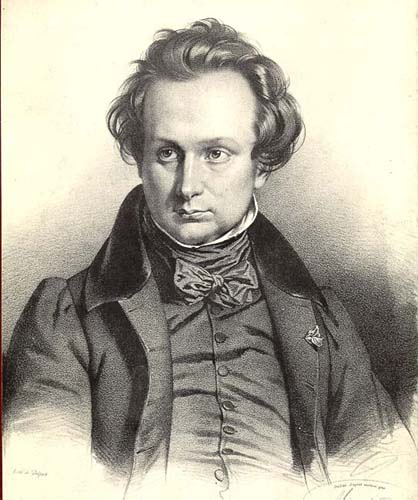Victor Hugo as Romantic
From The France of Victor Hugo (https://www.mtholyoke.edu/courses/rschwart/hist255/jkr/hugo.html)
As you read about Victor Hugo as the embodiment of French Romanticism, think about the ways that his attitudes towards art represented a challenge to the classicism of the Academy of Fine Arts
To think of French Romanticism is to naturally think of Victor Hugo. More than any other French writer of the 19th century, Hugo associated himself with the Romantic  Movement that swept through Europe and the rest of the world. It was a movement characterized by reliance on the imagination and subjectivity of approach, freedom of thought and expression, and an idealization of nature.
Movement that swept through Europe and the rest of the world. It was a movement characterized by reliance on the imagination and subjectivity of approach, freedom of thought and expression, and an idealization of nature.
As early as 1828, Hugo had associated with social liberty, and the freedom of the artist. He was convinced that 1830 [the date of the July Revolution that overthrew the monarchy of the Bourbons] was as important a date for poetry as it was for government. The 19th century, he often said, had two names: Romanticism and Socialism. The year 1830 marked for Hugo the definitive emergence of both.
Hugo associated with the Romantic Movement while it was still in its early infancy, and remained faithful to the Romantic cause all throughout his career, a career that spanned over three generations. He broke from the conventional 18th-century rules of French versification; and in the preface to his drama Cromwell (1827; translated 1896), a famous critical document in its own right, Hugo not only defended his break from traditional dramatic structure but also justified the introduction of the grotesque into art. Romanticism praised the genius of the extraordinary man. Hugo presented himself as the poet born of the ideological currents that shaped Romanticism, according to which the poet is a supremely individual creator, whose creative spirit is more important than strict adherence to formal rules and traditional procedures. Hugo identified with the Romantic Movement and felt it was his calling. In the early 1830's, when Romanticism was just starting, artists were invited to form an avant-garde, to convert the nation to the doctrine of Saint-Simon. The artist is alone capable of directing society, for he alone embraces both God and Man. . . .
He was the embodiment of the Romantic image of martyrdom when he went into exile in 1851. He tried in, 1848, to enter politics, hoping to become Prime Minister of the new government established by the younger Bonaparte; the attempt was a failure. The prince-president [Louis Napoleon]never had any intention of giving Hugo such an important position. Hugo became a violent critic of the new regime; and went into exile in 1851 when Bonaparte seized absolute power.
Hugo's power lay in his literary personality. As a lyric poet, as a writer of prefaces and articles, Hugo created for himself a persona. Hugo believed that: "Every man who writes, writes a book; this book is himself. Whether he knows it or not, whether he wishes it or not, it is true. From every body of work, whatever it may be, wretched or illustrious, there emerges a persona, that of the writer. It is his punishment, if he is petty; it is his reward, if he is great". And certainly, by his own definition, Victor Hugo was great. This belief he incorporated into the actions of his characters. In perhaps his most famous novel, Les Miserables, Marius Pontemercy courts young Cosette from afar, and wins her affections with a love letter; his way of baring the depth of his love for her to see, and which revealed a sense of the silent agonies he endured on her behalf. Marius crafted his persona with words, representing and embodying himself in a letter, and he gave this letter to the woman he loved, in the hopes that she would see the depth and sincerity of his love. And like the character he created, Hugo revealed a part of himself in everything he wrote, he incorporated his life into his stories, and drew from his own experiences, and he gave away his views on certain subjects in his writing. His disgust at the treatment of the poor and for the conditions in French prison and in the corruptness of the French judicial system he made very clear in Les Miserables. He sought compassion for the poor and reform for the prisons by creating characters that touched the hearts of his readers, and which challenged them to think and encouraged them to change.
.